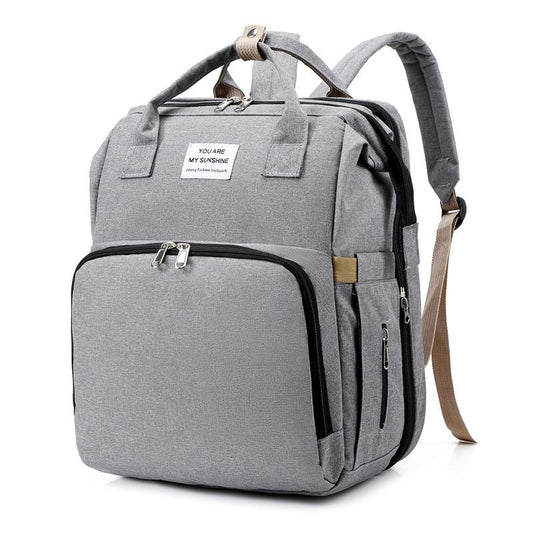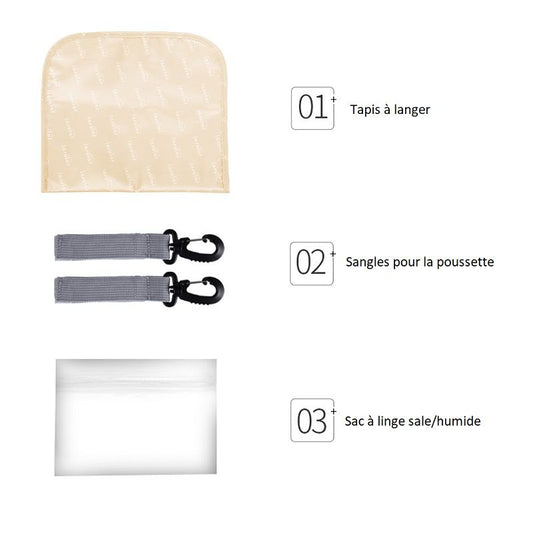In conversations between new parents (and not so new parents), the following question is very recurrent: how to calm a crying baby?
Crying is a fundamental form of communication for newborns. All babies cry and sometimes become fussy or irritable, it's a natural response to their needs and how they express discomfort, hunger, sleep or discomfort. As new parents, it can be difficult to deal with your newborn's crying and learn to identify the reasons why. It is for this reason that we have put together this guide in which we explore the different reasons, strategies and tips that will help you deal with a crying baby.
Identify the baby's needs
First of all, it is essential to learn to recognize the baby's needs to understand why he is crying. There are several reasons why a baby may cry, some of them may be:
Hunger
Hunger is one of the most common needs that cause a baby to cry. Newborns have small stomachs and need to feed frequently . If it's been a long time since your last meal, your baby may cry to signal that he or she is hungry.
Fatigue
Just like adults, babies are tired and need to sleep. Crying can be a sign that the newborn is exhausted and needs to rest. Helping him establish a good sleep routine is essential to prevent him from reaching a state of extreme fatigue.
Tunes / Need to burp
After feeding, babies can accumulate air in their stomach, which can cause them great discomfort. If your baby cries after feeding, he may need to burp to release trapped gas and feel better.
Overstimulation
Babies have a lower threshold for stimulation than adults and may cry if they are overwhelmed by too much noise, bright lights, or a large amount of stimuli. Providing a calm environment and reducing stimulation can help calm the baby.
Inappropriate temperature
Babies are sensitive to temperature changes. If the baby is cold or hot, he may cry to indicate discomfort. Make sure the room temperature is appropriate and dress the newborn in clothing appropriate for the occasion.
Dirty diaper
A dirty or wet diaper can cause irritation and discomfort in the baby. Checking regularly to see if the diaper needs to be changed and making sure to keep it clean and dry can prevent the newborn from crying for this reason. You can take a look at our changing tables, perfect for changing your baby comfortably, wherever you are.
Colic, how to manage it?
First, colic is recurring episodes of inconsolable crying, usually in healthy, well-nourished babies. They usually appear around 2 to 5 weeks of the newborn's life and usually disappear by 3 to 4 months of age. It's important to keep in mind that colic is not the parents' fault or a reflection of their ability to care for the baby. This is a normal phase that can appear in their development and which can be overcome over time.
Some tips that can help alleviate them:
- Massage the baby's belly: A gentle massage of the abdomen area can help relieve discomfort caused by colic. Make light circular movements with your hands in a clockwise direction. Make sure your hands are warm and you apply gentle but firm pressure.
- Try different positions: Experiment with different positions to calm your baby. Some babies feel better when held up on your shoulder, while others prefer to lie face down on your lap. Some also find relief in a fetal position or in a rocking chair.
- Use relaxation techniques: Certain relaxation techniques can help calm your baby during colic episodes. Try soft music, white noise (like the sound of a fan), a warm bath or even a stroll in a stroller. These techniques can help distract the baby and give him a sense of calm.
- Establish a calming routine: Creating a calm routine before bed can help relieve colic and make it easier for your baby to sleep. This may include activities such as a warm bath, gentle massage, gentle lullabies, and creating a quiet, dark environment in the room.
It's important to remember that every newborn is different and some methods may be more effective than others in relieving colic. Patience and experimentation are key to finding what works best for each newborn.
If you feel overwhelmed or overwhelmed, don't hesitate to seek help from healthcare professionals, such as pediatricians or lactation specialists. They will be able to provide you with additional advice and reassure you in this process. Remember that colic is temporary and over time you and the baby will outgrow it.
Techniques for calming a crying baby
We offer you a list of effective techniques you can try to calm your baby when he cries:
1. Observe the baby's signs: Pay attention to any signs that may indicate the cause of the baby's discomfort. Hunger, pain, or illness are usually some of the possible reasons, although it can sometimes be difficult to pinpoint the exact reason. Observing and listening carefully to your newborn will help you better understand their needs and respond to them appropriately.
2. Increase physical contact: Holding baby in your arms provides security and calm. Skin-to-skin contact, cooing and gentle rocking are comforting for the newborn.
3. Rock the baby: Rhythmic, gentle movements soothe newborns. You can rock him in your arms, in a rocking chair or use a baby swing.
4. Swaddle your baby: Wrapping your newborn in a soft, warm blanket provides calm and comfort, helping to prevent them from waking up.
5. Carrying baby: Calm walks both outside and inside can be effective. Movement and new sensory stimuli help distract and relax the baby.
6. Give him a massage: Gently massaging your baby's body can help him relax and get used to his own body.
7. Bathe the baby: A warm water bath can be very relaxing. Use gentle, skin-friendly bath products and gently rock your baby in the water.
8. Allow sucking: Sucking can provide relief, either with a pacifier or while breastfeeding, although opinions differ on this subject.
9. Monotonous sounds: Repetitive, monotonous sounds, such as the sound of a washing machine or fan, can have a calming and relaxing effect.
10. Stay calm: Caregivers must remain calm and collected because the baby perceives stress. Take moments to relax, this will help you be more receptive to calming the newborn.
Every baby is unique and it can take time to figure out what works best to calm each baby. As you become more familiar with your baby's cues and needs, you will gain confidence in your ability to provide the care and calm he needs.






















































